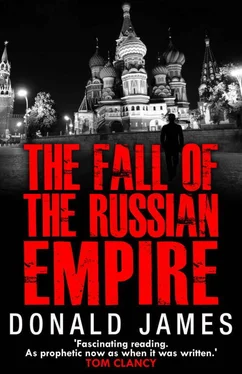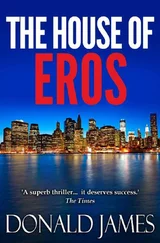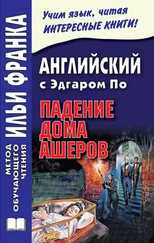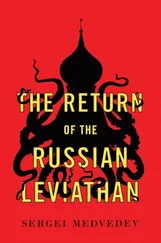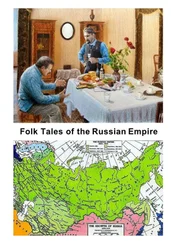At three o’clock that morning a patrolling guard discovered the body of a man on the snow-covered path below an open seventh-floor window. No one, in the subsequent inquiry, was able to establish how Patient Igor Alexandrovich Bukansky acquired a key to unlock the normally secure armor-plate window.
During the early hours of December 20th, the penals in the great Pavlovsky compound tore down the chain-link fence and marched out. Before this vast assemblage of men, the guards on the improvised machine-gun platforms fearfully held their fire. In the intense cold, the Gulag Regiments, each flying a rough-sewn national flag of one of the autonomous republics, formed up on the Moscow highway and set out for the capital. They were going home.
Perhaps messengers were dispatched to Noginsk, or perhaps an independent decision had been taken there, but however it happened, the men in the smaller camp broke out of their compound at just after dawn. In long ragged columns they, too, set off on the 25-mile march to the city. Like the Pavlovsky Gulag Regiments they were unarmed.
In the early dawn the two columns marched roughly parallel routes for the first hours. The Noginsk column, with the more direct route to Moscow’s eastern suburbs, found itself only a half-mile behind the Pavlovsky Gulags where the two roads joined at the M8 highway. The commissary of each Gulag Regiment was adequately stocked. The dawn was cold but not intolerable. As they marched the regiments sang the sad convict songs of Siberia.
* * *
The train journey [wrote Zoya], for all its comfort and good food, was a nightmare. Every town along the way seemed crowded with penals. We passed through stations where hundreds of men were sleeping on the platforms, others where militiamen were struggling to control them, yet others where the penals themselves seemed to be in control. Then bricks and iron bars would be hurled at the windows as our train sped through.
At night, as we got closer to Moscow, we could see the fires blazing in towns on either side of the railway line. From the train, at least, our impression was that the whole area north of the capital was in the grip of anarchy.
I remember the blue-and-white station boards announcing our arrival in Vologda. It was early morning and we could see a pall of smoke drifting across the town. The outskirts seemed empty of people and vehicles except for a few trucks abandoned in the middle of the street or a burned-out trolleybus turned on its side.
Then to our alarm we heard the train’s brakes squealing, jerking us forward violently onto the official and his wife and daughter in the seats opposite.
As the train crept forward slowly through the marshaling yards we could see that Vologda Station was a burned-out skeleton of iron work.
We stopped. Hanging out of our broken window (we had received a brick through it at the last station) I saw that the men on the locomotive had jumped down and were trying to swing the canvas water funnel across the top of the engine. I also saw through the fretwork of black metal, a group of perhaps fifty horsemen galloping down the street toward the station.
Within moments the whole train was an uproar of screaming women and frightened men. The horsemen galloped through the wrecked station, swerving round obstacles and leaping fallen iron girders with incredible skill. There was no need to see their faces to know that they were Asiatics from one of the horse-worshipping Central Asian Republics. Or to know that they were penals.
We were dragged from the train and lined up along the platform. Any man carrying a gun was taken off and shot before our eyes. These men, these penals, brutalized by years in the northeast camps, had no pity for the vlasti when they found them trembling and begging before them.
Other horsemen arrived as I stood shivering in the dawn cold, huddled next to Laryssa. One or two of the women, especially the middle-aged ones in silk dresses and furs, were hauled away and we heard their screams of panic from behind the station a few moments later. But Laryssa and I were left untouched. The penals (we hadn’t yet learned to call them Gulag Regiments) were more interested in dragging the vlasti ’s possessions from the cattle trucks at the back of the train.
We were still awaiting our fate when one of the horsemen, galloping along the line of trembling vlasti , reined his horse violently and turned back toward me .
I looked up terrified into the Asiatic face that smiled toothlessly down at me. “It’s the doctor,” he said. He swung off his horse and came over and clasped me in his arm. “It’s the doctor from Panaka Five,” he repeated, stepping back. “What are you doing with this trainload of rubbish, Comrade Doctor?”
Laryssa giggled near hysterically. The man turned. “I remember you, too,” he said, shaking her hand.
“I was the doctor’s assistant,” Laryssa said hurriedly. “Look, we just fell in with this lot for the ride back to Moscow. Tell us what’s happening, friend.”
One or two of the officials and their wives gathered round us, but the Asiatic gave them such a menacing hiss of hate that they quickly fell back.
“We’re taking the train,” he said. He gestured to the officials. “The ordure here will be lucky to get away with their lives.”
“You’re going to Moscow?”
“Moscow first, then home.”
“Take us to Moscow,” Laryssa said. “Can you do that?”
He shrugged. “That depends on the cripple,” he said doubtfully.
“The cripple?” I could see something light up in Laryssa’s face.
“The cripple’s our leader now. He gives the orders.”
We were taken before Bubo in the headquarters he had set up in Lenin Square.
I had never seen Laryssa so happy. After the tears and kisses she kept circling him, prodding at his chest or arm with her finger as if in need of further confirmation that it was really her man.
And Anton was with him. Not in the office when we arrived. In fact he was down at the station supervising the loading of their horses into the cattle cars. Bubo sent a messenger down straight away but simply to tell Anton that he was wanted in Lenin Square immediately. No mention was to be made of me.
Then he poured vodka.
I can remember the nervous excitement of that short wait, even to this day. I think Bubo must have been telling Laryssa what had happened since we were separated at Panaka. Then I hardly absorbed a single sentence. Only later the pieces came together.
When I heard his step outside and his voice shouting to Bubo I ran toward the door and literally exploded into his arms as the brute walked in.
He was no more coherent than I was. “Holy Jesus,” he kept saying. “Holy Mother of God” and all sorts of other strange incantations from his village past. And then I was just like Laryssa. I could not stop touching his hand or edging close to him as we four drank our way through a bottle.
The first toast, I’m glad to say we remembered, was to Anna.
Walking hand in hand through the town we selected a house. The door was open, the rooms richly furnished. What did we care that afternoon about the fate of the vlasti who had lived here? We wandered from floor to floor. In the kitchen we collected glasses and a bottle of vodka, in the vaulted bedroom we lit a huge fire and threw ourselves upon the wide oak bed.
I undressed him. Undressing myself I nestled between his legs.
He reached down touching my hair as my tongue ran over him. “If we’d met somewhere else, other than in Panaka,” he said, “would we still feel like this about each other?”
I looked up. “We did,” I reminded him. “We met in Leningrad.”
Читать дальше
